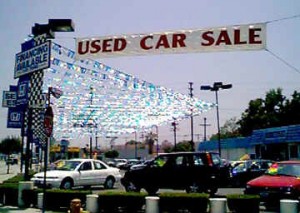A common debate among those shopping for automobiles is whether to buy a new car or a used car. It just so transpires that either decision carries different risks and benefits.
New cars generally cost more, but considering the recent sluggish activity of our economy, certain models are less expensive to buy new, or the price difference between a new model and a used or certified pre-owned model is decidedly negligible. For example, the monthly payments on a new BMW Z4 two-door convertible are $724, whereas buying a used model would cost about seven dollars more per month. Over five years, by buying it new, you would save $420 on the purchase price of this particular car. However, to become the proud owner of a certified pre-owned BMW Z4 convertible, one would pay $717 per month, which double the savings compared to buying this model used. Overall, the price differences between used, new, and certified pre-owned BMW Z4 convertibles are within a few hundred dollars of each other, which is chicken-feed compared to the vehicle’s $43,000 price tag.
However, a new car begins to depreciate in value the minute the consumer drives it away from the lot. Within three years, forty per cent of the value will have diminished, but after three years, the depreciation begins to slow down. Most used cars come into market after their owners have absorbed the longest or steepest portion of the depreciation cycle. Under the normal run of things, if you buy a used car at the beginning of the low-cost part of the car ownership cycle, you will find that you save money overall not only on the purchase price, but also on the financing, insurance premiums, registration and licensing fees and can avoid sales tax altogether.
Then again, new cars need less maintenance than used ones, and often come with a warranty, which may be extended by some new car dealers. A new car dealer will also often cover the routine maintenance necessary after the first several thousand miles, particularly an oil change and a tune-up. As long as the car is under warranty, roadside assistance is also free. Should the new car prove to be excessively problematic, state lemon laws dictate that the consumer is entitled to an exchange or a refund.
That being said, factory warranties are transferable between owners, and some can be extended by the dealerships as well. In addition, certain luxury car makers such as Mercedes Benz and Lexus pioneered the idea of certified pre-owned vehicles, which give the owner of purchasing a car that is just like new, right down to its warranty.
Is it better to buy a new car or a used car? Inevitably, such a decision is not only purely aesthetic, but also can be skewed by make, model, economy and budget. As a buyer, use your own best judgement.

